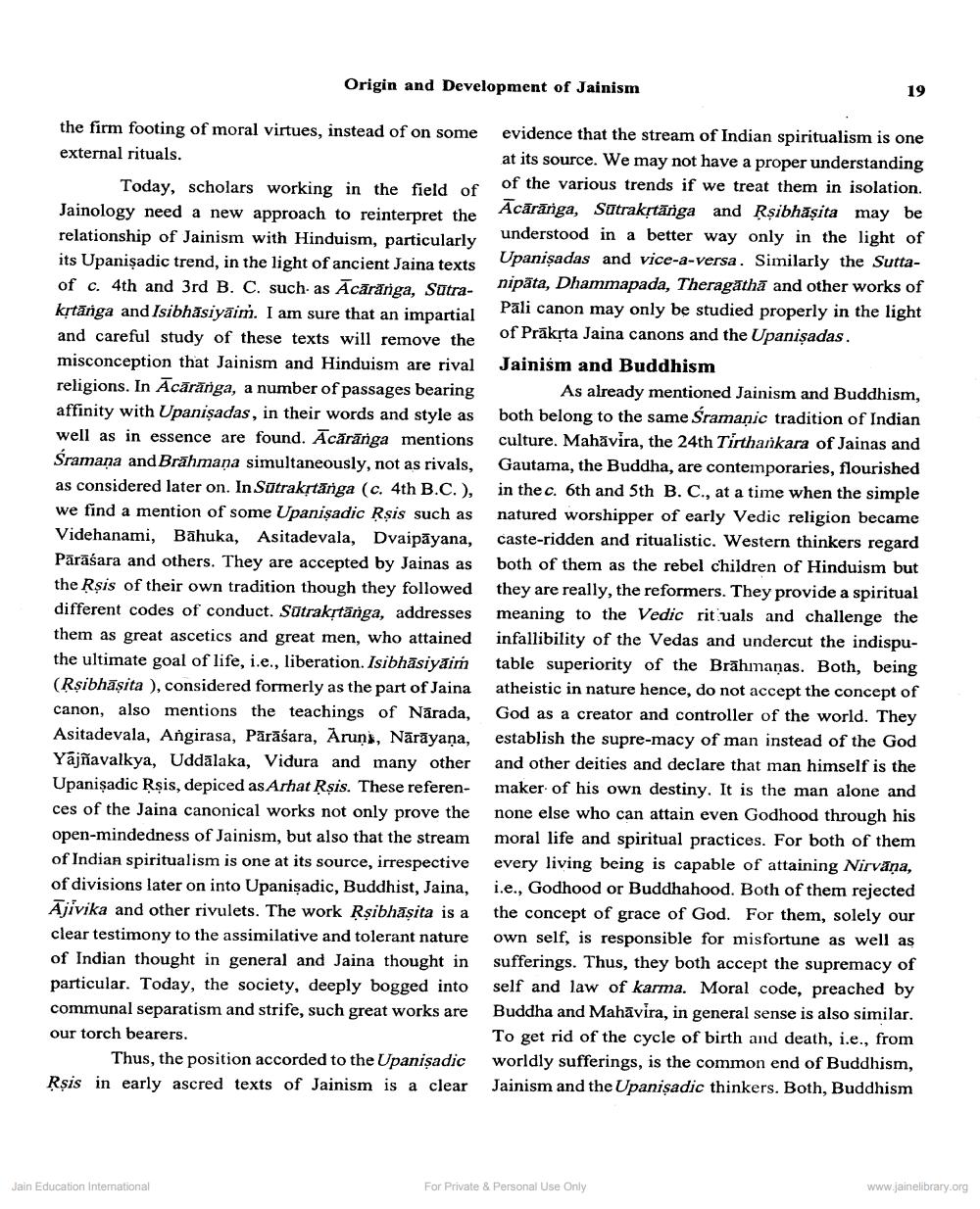Book Title: Origin And Development Of Jainism Author(s): Sagarmal Jain Publisher: Z_Jaina_Literature_and_Philosophy_a_Critical_Approach_001936_HR.pdf View full book textPage 5
________________ Origin and Development of Jainism the firm footing of moral virtues, instead of on some evidence that the stream of Indian spiritualism is one external rituals. at its source. We may not have a proper understanding Today, scholars working in the field of of the various trends if we treat them in isolation. Jainology need a new approach to reinterpret the Ācārānga, Sūtrakịtānga and Rşibhāșita may be relationship of Jainism with Hinduism, particularly understood in a better way only in the light of its Upanișadic trend, in the light of ancient Jaina texts Upanişadas and vice-a-versa. Similarly the Suttaof c. 4th and 3rd B. C. such as Acāränga, Sutra nipäta, Dhammapada, Theragātha and other works of krtānga and Isibhāsiyāim. I am sure that an impartial Pali canon may only be studied properly in the light and careful study of these texts will remove the of Prākta Jaina canons and the Upanişadas. misconception that Jainism and Hinduism are rival Jainism and Buddhism religions. In Ācārārga, a number of passages bearing As already mentioned Jainism and Buddhism, affinity with Upanişadas, in their words and style as both belong to the same Šramanic tradition of Indian well as in essence are found. Ācārānga mentions culture. Mahavira, the 24th Tirthankara of Jainas and Sramana and Brāhmaṇa simultaneously, not as rivals, Gautama, the Buddha, are contemporaries, flourished as considered later on. In Sūtrakrtănga (c. 4th B.C.), in the c. 6th and 5th B. C., at a time when the simple we find a mention of some Upanişadic Rsis such as natured worshipper of early Vedic religion became Videhanami, Bāhuka, Asitadevala, Dvaipāyana, caste-ridden and ritualistic. Western thinkers regard Parāśara and others. They are accepted by Jainas as both of them as the rebel children of Hinduism but the Rșis of their own tradition though they followed they are really, the reformers. They provide a spiritual different codes of conduct. Sutrakịtānga, addresses meaning to the Vedic rituals and challenge the them as great ascetics and great men, who attained infallibility of the Vedas and undercut the indisputhe ultimate goal of life, i.e., liberation. Isibhāsiyāim table superiority of the Brāhmaṇas. Both, being (Rşibhāșita ), considered formerly as the part of Jaina atheistic in nature hence, do not accept the concept of canon, also mentions the teachings of Narada, God as a creator and controller of the world. They Asitadevala, Angirasa, Pārāśara, Aruns, Nārāyaṇa, establish the supre-macy of man instead of the God Yajñavalkya, Uddalaka, Vidura and many other and other deities and declare that man himself is the Upanișadic Rşis, depiced as Arhat Rşis. These referen- maker of his own destiny. It is the man alone and ces of the Jaina canonical works not only prove the none else who can attain even Godhood through his open-mindedness of Jainism, but also that the stream moral life and spiritual practices. For both of them of Indian spiritualism is one at its source, irrespective every living being is capable of attaining Nirvāņa, of divisions later on into Upanişadic, Buddhist, Jaina, i.e., Godhood or Buddhahood. Both of them rejected Ajivika and other rivulets. The work Rşibhāşita is a the concept of grace of God. For them, solely our clear testimony to the assimilative and tolerant nature own self, is responsible for misfortune as well as of Indian thought in general and Jaina thought in sufferings. Thus, they both accept the supremacy of particular. Today, the society, deeply bogged into self and law of karma. Moral code, preached by communal separatism and strife, such great works are Buddha and Mahāvira, in general sense is also similar. our torch bearers. To get rid of the cycle of birth and death, i.e., from Thus, the position accorded to the Upanişadic worldly sufferings, is the common end of Buddhism, Rșis in early ascred texts of Jainism is a clear Jainism and the Upanișadic thinkers. Both, Buddhism Jain Education International For Private & Personal Use Only www.jainelibrary.orgPage Navigation
1 ... 3 4 5 6 7
